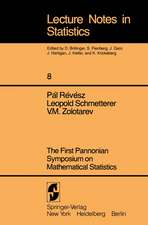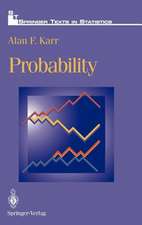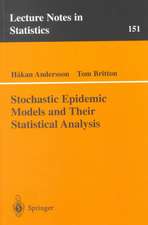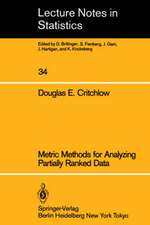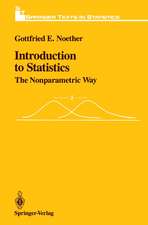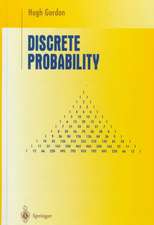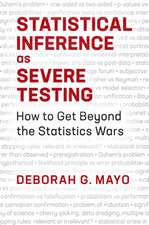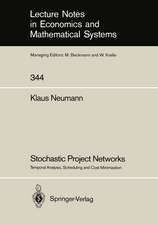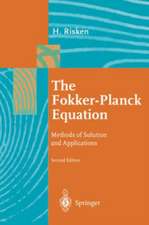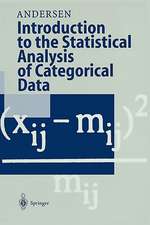Science Dynamics and Research Production: Indicators, Indexes, Statistical Laws and Mathematical Models: Qualitative and Quantitative Analysis of Scientific and Scholarly Communication
Autor Nikolay K. Vitanoven Limba Engleză Hardback – 11 aug 2016
Toate formatele și edițiile
| Toate formatele și edițiile | Preț | Express |
|---|---|---|
| Paperback (1) | 388.52 lei 6-8 săpt. | |
| Springer International Publishing – 12 iun 2018 | 388.52 lei 6-8 săpt. | |
| Hardback (1) | 396.02 lei 6-8 săpt. | |
| Springer International Publishing – 11 aug 2016 | 396.02 lei 6-8 săpt. |
Preț: 396.02 lei
Nou
Puncte Express: 594
Preț estimativ în valută:
75.80€ • 82.37$ • 63.72£
75.80€ • 82.37$ • 63.72£
Carte tipărită la comandă
Livrare economică 22 aprilie-06 mai
Preluare comenzi: 021 569.72.76
Specificații
ISBN-13: 9783319416298
ISBN-10: 3319416294
Pagini: 297
Ilustrații: XVIII, 285 p. 5 illus.
Dimensiuni: 155 x 235 x 18 mm
Greutate: 0.6 kg
Ediția:1st ed. 2016
Editura: Springer International Publishing
Colecția Springer
Seria Qualitative and Quantitative Analysis of Scientific and Scholarly Communication
Locul publicării:Cham, Switzerland
ISBN-10: 3319416294
Pagini: 297
Ilustrații: XVIII, 285 p. 5 illus.
Dimensiuni: 155 x 235 x 18 mm
Greutate: 0.6 kg
Ediția:1st ed. 2016
Editura: Springer International Publishing
Colecția Springer
Seria Qualitative and Quantitative Analysis of Scientific and Scholarly Communication
Locul publicării:Cham, Switzerland
Cuprins
Complex Structure and System of Science - Quality and Quantity in the Study of Science, Scientific Work and Scientific Productivity - The Role of Mathematics.- Scientific Productivity of Individual Researchers.- Indexes for Characteristics of Research Productivity in a Group of Researchers.- Comparison of Research Productivities of Groups of Researchers.- Frequency and the Rank Approaches to Scientific Productivity.- Selected Models for Evolution of Research Organizations and Scientific Productivity.- Several Concluding Remarks.
Notă biografică
Textul de pe ultima copertă
This book deals with methods to evaluate scientific productivity. In the book statistical methods, deterministic and stochastic models and numerous indexes are discussed that will help the reader to understand the nonlinear science dynamics and to be able to develop or construct systems for appropriate evaluation of research productivity and management of research groups and organizations. The dynamics of science structures and systems is complex, and the evaluation of research productivity requires a combination of qualitative and quantitative methods and measures. The book has three parts. The first part is devoted to mathematical models describing the importance of science for economic growth and systems for the evaluation of research organizations of different size. The second part contains descriptions and discussions of numerous indexes for the evaluation of the productivity of researchers and groups of researchers of different size (up to the comparison of research productivities of research communities of nations). Part three contains discussions of non-Gaussian laws connected to scientific productivity and presents various deterministic and stochastic models of science dynamics and research productivity. The book shows that many famous fat tail distributions as well as many deterministic and stochastic models and processes, which are well known from physics, theory of extreme events or population dynamics, occur also in the description of dynamics of scientific systems and in the description of the characteristics of research productivity. This is not a surprise as scientific systems are nonlinear, open and dissipative.
Caracteristici
Presents mathematical methods to evaluate the efficiency of research Describes models, indicators and indexes to quantify research productivity Shows ways to improve the output of research groups and organizations Discusses nonlinear dynamics of scientific entities Includes supplementary material: sn.pub/extras






